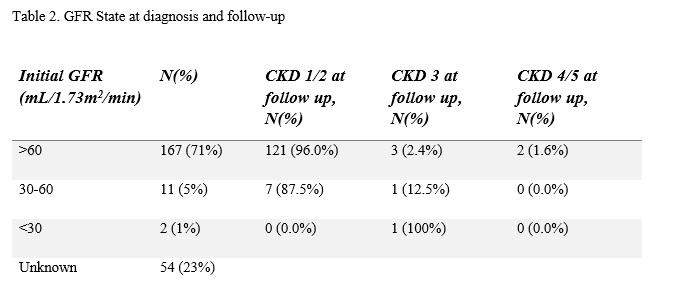Session Information
Date: Monday, November 9, 2020
Title: Pediatric Rheumatology – Clinical Poster III: SLE, Vasculitis, & JDM
Session Type: Poster Session D
Session Time: 9:00AM-11:00AM
Background/Purpose: Lupus nephritis (LN) is a well-established and life-threatening manifestation of systemic lupus erythematosus (SLE) that is more common in children than adults. The demographics of childhood-onset SLE (cSLE) and management of disease have changed over time, prompting the need to update outcomes. The purpose of this study is to use the Childhood Arthritis and Rheumatology Research Alliance (CARRA) prospective registry to validate historical principles about LN in a contemporary, real-world cohort.
Methods: Through literature review of LN studies in cSLE patients from 1992 to 2012, the following principles were identified:
- 20%-75% of cSLE patients will develop LN
- LN develops within 1 year of diagnosis in 82% of cSLE patients; 92% develop LN within 2 years of diagnosis
- Membranous (ISN/RPS class V) LN more often presents with nephrotic-range proteinuria than does proliferative LN (class III or IV)
- Short-term renal outcomes are worse in Black vs non-Black patients
- Short-term renal outcomes are worse in patients who present with eGFR < 60mL/min/1.73 m2 and/or moderate proteinuria (urine protein: creatinine ratio (UPC) > 1 mg/mg)
- Rituximab is used as a steroid-sparing agent for induction in proliferative LN
The CARRA registry was queried to determine the rates of LN in cSLE, time from diagnosis to LN, presentation at LN onset, short-term renal outcomes, and instances of rituximab as induction therapy. The eGFR (calculated by the modified Schwartz equation) was separated into 3 stages of chronic kidney disease (CKD) for analysis: 1: >60ml/min/1.73 m2, 2: 30-60ml/min/1.73 m2, and 3: < 30ml/min1.73 m2. Occurrences of end-stage renal disease (ESRD), transplant, and dialysis were recorded. We compared eGFR change over time in Black vs non-Black subjects. This study was exempt from Institutional Board Review.
Results: Of the 675 cSLE patients in the CARRA registry, 235 (35%) had documented LN. Of those, 74% were diagnosed with LN within 1 year and 87% within 2 years of cSLE diagnosis. Table 1 describes the LN classes. eGFR decline was more common in Black cSLE patients than non-Black patients (p=0.04). Changes in eGFR over time are described in Table 2. Three patients were documented as being on dialysis. Nine were reported to have ESRD. No renal transplants were reported. Of those with LN, 24.3% were treated with rituximab with no statistically significant difference by LN class, sex, or age.
Conclusion: In the CARRA registry, 35% have LN, in range of prior literature estimates. Of those that have LN, 74% developed it within the first year of their lupus diagnosis, slightly lower than prior reports of 82%. Black race remains associated with worse short-term renal outcomes. In short-term follow up, most eGFR remained unchanged or improved and ESRD was rare. A study limitation is the inception cohort is 2 years old and some data were unavailable. Efforts are underway to study long-term outcomes in the CARRA registry to better inform on contemporary rates and outcomes of LN in cSLE.
To cite this abstract in AMA style:
Vazzana K, Daga A, Goilav B, Ogbu E, Okamura D, Park C, Sadun R, Smitherman E, Stotter B, Wenderfer S, Lewandowski L. Principles of Pediatric Lupus Nephritis in a Contemporary Multi-Center Cohort [abstract]. Arthritis Rheumatol. 2020; 72 (suppl 10). https://acrabstracts.org/abstract/principles-of-pediatric-lupus-nephritis-in-a-contemporary-multi-center-cohort/. Accessed .« Back to ACR Convergence 2020
ACR Meeting Abstracts - https://acrabstracts.org/abstract/principles-of-pediatric-lupus-nephritis-in-a-contemporary-multi-center-cohort/


